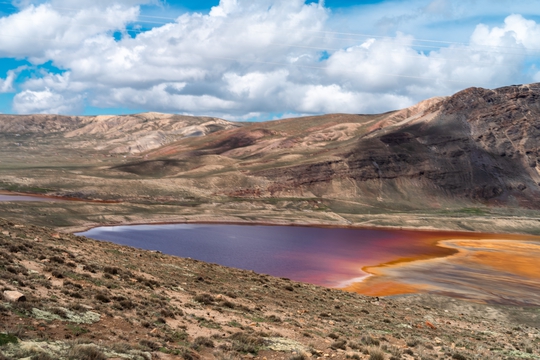Confronting Eco-Apartheid
by
Kai Heron (@KaiHeron)
September 21, 2023
Featured in Seeds of Struggle: Food in a Time of Crisis (#18)
Climate catastrophe is already here.

theory
Confronting Eco-Apartheid
by
Kai Heron
/
Sept. 21, 2023
in
Seeds of Struggle: Food in a Time of Crisis
(#18)
Climate catastrophe is already here.
In 2019 the then UN special rapporteur on extreme poverty and human rights, Philip Alston, warned that the world was perilously close to an “eco-apartheid scenario” in which the rich pay to escape the effects of ecological collapse, while the world’s poor and working classes are exposed to unbearable wildfires, floods, storms, and crop failures. According to Alston, global mitigation efforts were so far “patently inadequate” and “entirely disproportionate to the urgency and magnitude of the threat.” Unless efforts were ramped up, “democracy and the rule of law, as well as a wide range of civil and political rights are every bit at risk… the risk of community discontent, of growing inequality, and even of greater levels of deprivation among some groups, will likely stimulate nationalist, xenophobic, racist, and other responses.”
It’s been four years since Alston delivered this warning and nothing essential has changed. Fossil capital still lobbies against all attempts to reduce emissions, agribusinesses still downplay their responsibility for ecological collapse, and the world’s neo-colonial and imperialist powers — the United States and Western Europe — have systematically refused to extend meaningful support to so-called ‘developing countries’. Using the war in Ukraine as a pretext many including the UK have even licensed further fossil fuel extraction. We do, however, know that the world’s compounding ecological crises are already much worse than they seemed in 2019. It is now expected that global temperatures will surpass the dangerous threshold of 1.5C above pre-industrial levels by 2027, with dire consequences for all human and non-human life.
Colonial Legacies
But contrary to Alston’s predictions, eco-apartheid is not something awaiting us in the near or distant future. It is here, now, and plain for all to see. Most of us are familiar with the fact that through a cruel twist those who were historically subjected to colonization, are today subjected to imperialist super-exploitation, and who have had the least responsibility for global heating, to lethal floods, droughts, and food shortages. To take some recent examples almost at random: In 2022 100 people died and millions were displaced by the worst floods in Bangladesh’s history. Then, in May this year, Cyclone Mocha poured misery on misery as it tore through Bangladesh as well as India and Myanmar killing over 400 people and displacing hundreds of thousands across the region. That same week over 400 people were killed by floods and devastating landslides in the Democratic Republic of Congo. Meanwhile, a catastrophic drought in Ethiopia has plunged millions into desperation.
In today’s rapidly warming world these events have the peculiar quality of being at once unfathomably tragic and routine, singularly lethal and monotonous in their predictability. This is one symptom of eco-apartheid. Those exposed to these spectacular events, and to less spectacular though no less deleterious socio-ecological disasters, are generally speaking the periphery’s working classes and racialized poor. Those who hear about them in dismay — or maybe don’t hear about them at all — are generally speaking those protected from the worst effects of climate collapse by wealth or geographic fortune. Movements and unions in the imperialist core must do all they can to raise awareness of these injustices, to shut down the fossil fuel industry, and support fellow workers in the world-system’s periphery.
Green Transitions or Eco-Apartheid?
But there is a much less appreciated driver of eco-apartheid that needs tackling today. Factions of capital in the imperial core, and some unions, have swung behind a so-called “green transition” driven by a “green re-industrialization” of domestic economies. This, it is promised, will bring back good quality unionized jobs and drive down global emissions. At the risk of putting things too simply, proponents of such green capitalist transitions like to imagine that a liveable future for all can be achieved by unplugging ourselves from one fuel source — fossil fuels — and plugging ourselves into another — renewable energy — while perhaps commodifying nature through so-called ‘nature-based solutions’ and perhaps democratizing the core’s economy to some degree.
Though the extent of systemic change varies, Europe’s Green Deal, Bernie Sanders and Alexandria Ocasio Cortez’s Green New Deal, Joe Biden’s Inflation Reduction Act, the Conservative Party’s Green Industrial Revolution, and the UK Labour grass roots’ Green New Deal proposals are all examples of capitalist attempts to decarbonize the economy in this respect.
But the capitalist economy we live in and reproduce through our daily activities is not just predicated on burning fossil fuels. It rests on an imperialist world order that exploits workers in the core and super-exploits the periphery’s lands and labour. Fossil fuelled or not, capitalism is also a system that depends on processes of uneven ecological exchange, or the cheap export of raw materials and food stuffs from the periphery to the core and the dumping of waste, including plastics, pollutants, and toxic industries in the periphery. And it is an economy that requires wars to be waged, and economic sanctions imposed, to ensure access to essential resources.
All of these processes are intensely classed, gendered, and racialized. All of them contribute to eco-apartheid’s consolidation. None of them are challenged by a green transition. In fact, core’s transition to net-zero is creating new spaces of extraction and dispossession. Lithium for electric car batteries flows from the Lithium triangle between Argentina, Bolivia, and Chile. Rare earth minerals for wind turbines and solar panels are sourced from Congolese coltan mines. Landgrabs for biofuels, energy infrastructure, and carbon credit forests, are dispossessing Indigenous peoples, the poor, and racialized. Meanwhile, the toxic waste generated from producing these new infrastructures are dumped near racialized and poor communities in the capitalist core and beyond.
Eco-Apartheid’s Border and Labour Management
Eco-apartheid is an effect of these practices colliding with the core’s racialized border policies to create what anthropologist Catherine Besteman has called a system of “militarized global apartheid.” For Besteman, this regime has three characteristics. First, a racialized labour market dependent on differential access to mobility; second, the expansion of predatory systems of resource plunder by actors in the Global North that renders “localities in the global south unsustainable for ordinary life”; and third, the militarization of borders in the global north to keep out those from the global south who are hoping to a better life. Or, for that matter, any life at all.
Evidence of eco-apartheid in this sense is everywhere. Studies suggest by 2050 up to 1.2 billion people could be displaced by the effects of global heating. The International Displacement Monitoring Centre estimates that since 2008 318 million people have been forcefully displaced by floods, storms, earthquakes, or droughts. 30.7 million were displaced in 2020 alone. At the same time, as Harsha Walia, the Zetkin Collective, and others have shown, the capitalist core is intensifying the securitization of its borders and moving towards far-right, racist, and nativist positions. The recently held ‘National Conservativism’ conference in London is just a recent example.
We could also think of Europe’s response to the War in Ukraine. In a widely reported act of compassion, Poland took more than two million of their “brothers” from Ukraine in the first few months of the war. At the same time, Poland was building a wall costing 353 million Euros to keep out African and Middle Eastern refugees. They were the wrong kind of people. They were not European. They were not white.
Then there’s the UK’s decision to militarize its borders by putting the navy in control of patrolling the English Channel and its horrendous policy of transporting refugees to Rwanda, a country that is extremely vulnerable to the impacts of global warming due to the legacies of underdevelopment imposed upon it by colonial and neo-colonial rule such as its dependence on rain-fed agriculture and need for investment in healthcare, infrastructure, and water resource management.
This is eco-apartheid in practice, and though its influence is felt across all sectors of the global economy, special mention should be made of agrarian labour flows. During the COVID-19 pandemic, seasonal labourers were flown into the UK, against lockdown regulations, to pick fruit and vegetables under appalling conditions. They were then summarily flown back to their points of origin. More recently, an investigation found that Indonesian workers in British farms had been thrown into debt bondage. Seasonal workers picking crops for major supermarkets were required to pay for their travel and visa to the UK, immediately plunging them into up to £5,000 in debt. Workers were told that they would receive sufficient wages to pay off their debts and return home with some income. In practice, many were employed on zero-hour contracts and were not given enough work.
This is what the critical agrarian scholar, Tom Brass, calls “unfree labour”, or labour that lacks even the minimum degree of freedom afforded to labour under capitalism of finding work elsewhere in the economy. As Brass shows, unfree labour has always been an essential feature of capitalism’s agricultural sector, but as eco-apartheid intensifies, this practice will spill into new sectors of the economy. Hundreds of millions of people, desperate to flee inhospitable ecological conditions will collide with the imperial core’s equally inhospitable employment and border policies.
What can be done? First, movements and unions in the imperial core must unite with movements, unions, and demands from the Global South. The South’s various demands for reparations, food sovereignty, technology transfers, land back, the cessation of sanctions, and self-determination are all demands against the intensification of eco-apartheid. Second, unions must draw conceptual and practical connections between their own struggles and global ecological concerns. So-called ‘green industrial jobs’ in the core that are handed down by state and capital and that are predicated on the exploitation of the periphery’s lands and labour are not green industrial jobs. Instead, unions must demand international democratic control over industrial policy and international cooperation with workers in essential extractive industries. Third, unions must draw similar connections between their struggles to secure employment and the imperial core’s racialized border practices. Good quality jobs in the core cannot be predicated on racialized anti-worker violence made manifest through border checkpoints, visas, and anti-immigrant sentiment.
These are not easy demands. They oblige a radicalization and deeper politicization of the core’s unions and social movements, but anything less than this is complicity with eco-apartheid.
Subscribe to Notes from Below
Subscribe now to Notes from Below, and get our print issues sent to your front door three times a year. For every subscriber, we’re also able to print a load of free copies to hand out in workplaces, neighbourhoods, prisons and picket lines. Can you subscribe now and support us in spreading Marxist ideas in the workplace?


